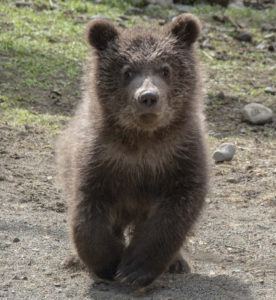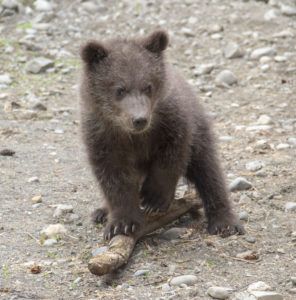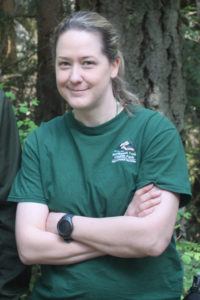He’s just a little guy – for a grizzly bear.
He weighs only about 75 pounds and stands just about 2 feet tall.
But by the time he’s an adult, this little orphan from Alaska could reach up to 11 feet tall, standing on his hind legs – and weigh into the hundreds of pounds.
And on Aug. 1, the six-month-old grizzly bear cub who was orphaned near Nome and fostered by caring keepers at Alaska Zoo over the last few months, will have a home at Northwest Trek Wildlife Park.
He’ll soon be joined by a yearling cub from Montana.

Orphaned cubs find a home
The cubs, both males, were orphaned when their mothers died. The Alaska cub lost his mom to hunters who illegally killed the nursing sow, while the Montana yearling, born in the spring of 2017, spent a year with his mother before she was killed by a farmer after she attacked his pigs.
He has been in the care of Montana Wild, which is operated by the Montana Department of Fish, Wildlife & Parks, since June 27. And soon, he, too, will be on his way to Northwest Trek.
The cubs would not have survived without human intervention after their mothers were killed, according to wildlife officials in Alaska and Montana.
They were urgently in need of homes. Happily, Northwest Trek is just completing renovations to its grizzly bear habitat.
So for the first time in its 43-year history, the wildlife park will be home to two grizzly bear cubs.
Northwest Trek guests will need to be patient for a bit, though; it will be some time before the cubs make their public debut.
They first must settle in, get to know the keepers and veterinarians who will care for them and, of course, get to know each other as “brothers.”
When they’re ready, the bears will be introduced to the wildlife park’s expansive forested habitat, which has been rebuilt to give them room to explore and protect them as they grow.
“It’s very gratifying that we are able to provide these orphaned bears a home at Northwest Trek,” said Metro Parks Tacoma Commissioner Erik Hanberg, who readily confesses to having a soft spot in his heart for grizzlies. “They are powerful, magnificent animals, and their presence at Northwest Trek will help tell the story of their species, which is endangered in Washington.”
Some of the funds for reconstruction of the wildlife park’s grizzly bear habitat were provided by Tacoma voters, who approved a $198 million Metro Parks bond issue in 2014. Northwest Trek is owned and operated by Metro Parks Tacoma.

Apples, cherries and toys
The Alaska cub was discovered emaciated and in need of care close to its mother’s body in an area near Nome. A caring team of zoologists at Alaska Zoo fed him formula as many as five times a day and then helped him grow and thrive with a diet of apples, Rainier cherries, produce, fish and high-protein dog food, Curator Shannon Jensen said.
He weighed only around 10 pounds – about half what he should have – when he arrived there in May. He now moves the weigh-scale meter all the way over to about 75 pounds, and is about 2 feet tall from nose to tail.
“He’s funny,” Jensen said of the cub’s personality. “He has no trouble playing by himself. He finds whatever toys we give him entertaining, even if it’s just a stick. He thinks a stick is great fun.”
The yearling grizzly from Montana was discovered in the northwestern portion of the state on the Blackfeet Indian Reservation between Browning and Valier. The young bear weighed about 75 pounds when he was taken to Montana Wild. Officials there said they believe he was born in the spring of 2017.
The cubs would not have survived in the wild without their mothers to help them learn how to hunt and teach them the ways – and dangers – of the forest, Northwest Trek Zoological Curator Marc Heinzman said.
“It’s unfortunate that they were orphaned,” Heinzman said. “But being raised together by knowledgeable keepers – and with excellent health care available – is the very best outcome for these cubs. We expect them to be residents at Northwest Trek for several decades.”

Northwest food (and a cub-proofed habitat)
As soon as the bears arrive, Northwest Trek keepers will begin to get to know them and set about providing them with the same kinds of foods – berries, plants, insects, and fish – that their mothers would have taught them to eat in the wild, bear keeper Angela Gibson said. They’ll get seasonal “dishes” such as strawberries, salmonberries and huckleberries in summer; fall will bring other foods for which a bear might forage in the wild, Gibson and other keepers will slowly introduce the two bears to each other with a see-through separation between their dens. Since they’ll meet and live together at such a young age, it’s expected they will become adopted “brothers,” perhaps with the older bear passing on some of the knowledge he learned from spending his first year with his mother.
It likely will be several weeks before they’re ready to explore their newly “cub-proofed” habitat, which includes climb-resistant flashing installed on trees so their aspirations don’t exceed their ability to get up the tree – and back down. And rather than a pool that can hold a fully grown grizzly, a smaller, much-less-deep pool will allow them to cool off in water that’s a safe depth.
Northwest Trek staff members will make alterations to the habitat to accommodate the bears as they grow.
Help us name them!
Before the cubs make their public debut, Northwest Trek keepers will supply a slate of suggested names. The public will be able to vote for their favorites.
Adult male grizzly bears (Ursus arctos) can stand 3-to-4-feet-tall at the shoulders and grow to 6-to-11-feet tall. They will weigh into the hundreds of pounds. Although many remain in Alaska, Montana and other states, grizzly bears are endangered in Washington. Northwest Trek is working with other conservation partners to support a federal plan that would return some bears to remote areas of the North Cascades.
“The importance of grizzly bears to the forests in which they live and the way in which they inspire our guests to care about their species cannot be overstated,” said Northwest Trek Deputy Director Rick Dietz. “We are delighted to be able to welcome these orphaned cubs to their new home.”
-Kris Sherman, Northwest Trek